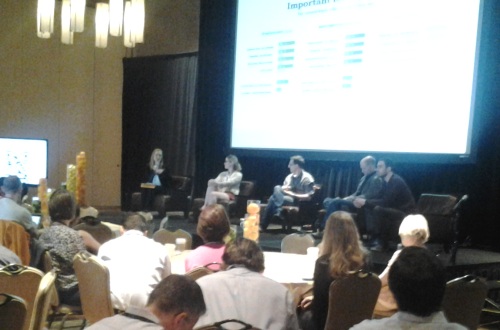I'm at the Global Coworking Unconference Conference (GCUC), the second annual coworking held in Austin before SXSW. My first impression – wow, coworking is all grow'd up. The size and professionalism of the event is a big shift from last year's less formal, grassroots effort. Oh, and apparently, coworking is not so much a movement anymore, it's an industry.
GCUC kicked off with a coworking state of the union. A strong theme emerged early that reflects the new maturity of the conference – that coworking is a major trend that continues to accelerate driven by a convergence of powerful underlying trends – recession, startup culture, the new precarity of workers, mobility enabled by technology, changing social relations, and the gender dimensions of work.
Panelist Campbell McKellar of Loosecubes, a leading coworking marketplace, underscored this with observations from her company's network of spaces – there are over 3,500 work spaces (not all coworking) listed in 600 cities from Kampala to Brooklyn, over 4,000 members have connected their Facebook accounts through the site so that coworkers can find friends in work spaces wherever they go in the world. She also noted that the rise of women in the workforce, and that while most coworkers are currently male, she expects more female coworkers due in part to the need for at least one member of dual income households to have flexible work.
Panelist Jean-Yves Huwart noted that organizations in Europe are turning to coworking to change social relations for the better, and accelerate innovation. He mentioned the example of Aalto Venture Garage at Aalto University in Finland which create an on campus Switzerland through coworking – the work space is neutral zone where faculty, students, and industry can mix as equals. He added that the community building and outreach strategies of coworking are powering a new wave of startup incubators such as TVT La Cantine in Toulon, France. Coworking is proving to be a better way to connect to outside players than old-style incubators.
More medium to large-sized corporations are entering coworking – as space owners, suppliers and tenants – because of the growing opportunity. Kevin Kuske from Turnstone (a division of Steelcase office furniture) said that 34.9% of the workforce will be mobile in 2013 and that corporations only want office space for about 60% of workers and to be flexible on the rest. He also sees interesting coworking hybrids emerging like Workspring, which offers corporations on-demand access to world-class teleconferencing and retreat space, and Grid70, which is a shared, open plan workspace exclusive to seven large complementary companies housed together for the sake of innovation.
Another sign of maturity is that an increasing number of coworking spaces are profitable. Panelist Carsten Foertsch of Deskmag said that 80% of coworking spaces are profitable after two years. At last year's coworking conference, there was concern about the sustainability of the industry linked to doubts about the profitability of spaces. Carsten pointed out that it's natural that new businesses aren't profitable right out of the gate, and that most spaces are young businesses. There seems to be no doubt about the future of the industry today at GCUC.
Despite the new maturity of the space, the panelist offered advice about how to strengthen coworking that's consistent with the past and why coworking took off in the first place – create spaces that make people feel comfortable and focus on creating community.









